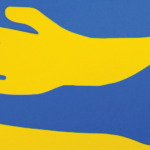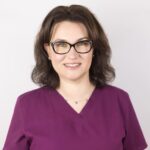“She sleeps in her shelter every night, and she has a 3-year-old daughter,” says Dr. Rackoff. “She could not have been calmer and more enthusiastic about being a rheumatologist.”
Now vs. Then: History of Antisemitism
Noting a history of antisemitism in Ukraine, Dr. Pillinger describes it as a complicated country that his Ukrainian mother-in-law, now 92, remembers as once inhospitable to Jews.
“My grandparents fled this part of the world because of antisemitism, and my wife’s parents were Holocaust survivors from the same region,” Dr. Pillinger writes in an email. “So to see the Ukrainians trying to create something better is inspiring—and to see the Russians trying to crush it is dispiriting.”
His wife, Judy Pillinger, a psychotherapist, was 11 when she and her family left the country. She also joined the mission and provided psychological support to both adult and child refugees.
Dr. Rackoff feels optimistic about the present Ukraine and its people. “It’s a different generation,” she says. “My great-grandparents left Ukraine because of antisemitism and, most likely, neighbors not willing to help.
“It’s simply my turn to show up and help my neighbors from afar.”
Rheumatologists living in Ukraine press on with their work of treating patients despite the ongoing war that began with a Russian military invasion. Learn more on our website.
Resolve & Optimism
Seeing and hearing stories, both sad and uplifting, left a lasting impression on members of the mission, they say.
Like the bracelets given to them by Lviv’s mayor, they take with them memories of Ukrainians who greeted them with warmth and displayed unbroken courage to carry on in the face of war.
“It’s got to get to you day to day that we’re very privileged people,” says Dr. Pillinger. “We’ll go home to our safe lives, but the Ukrainians are home; they’re living this.”
Catherine Kolonko is a medical writer based in Oregon.


